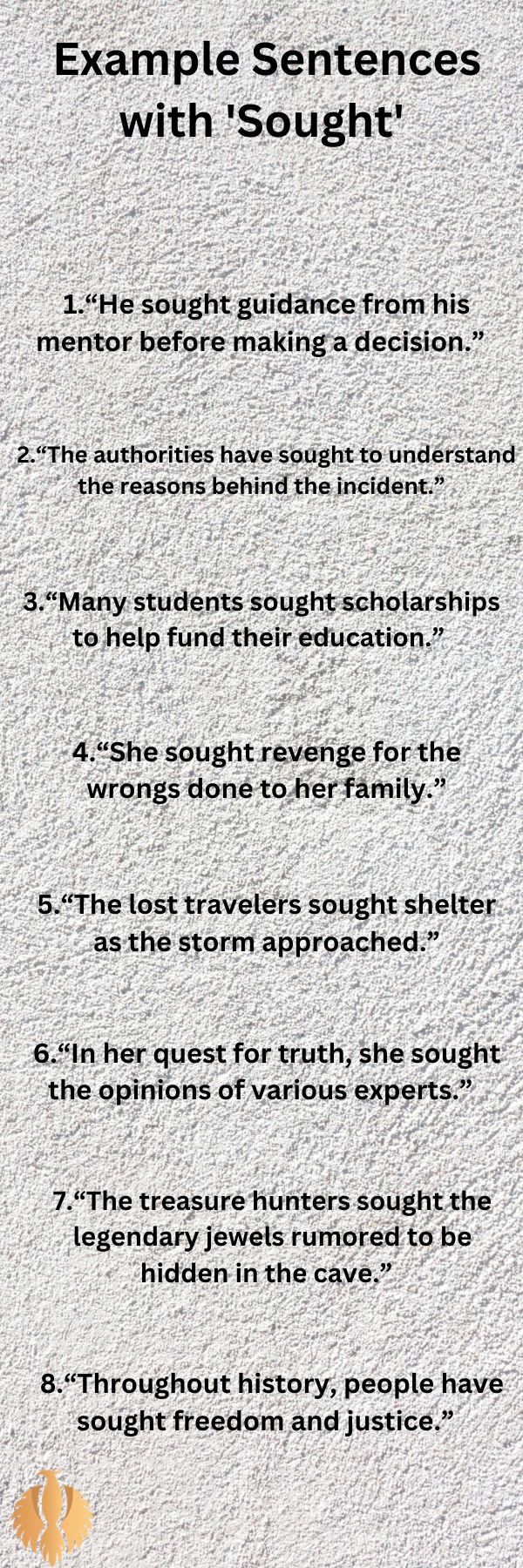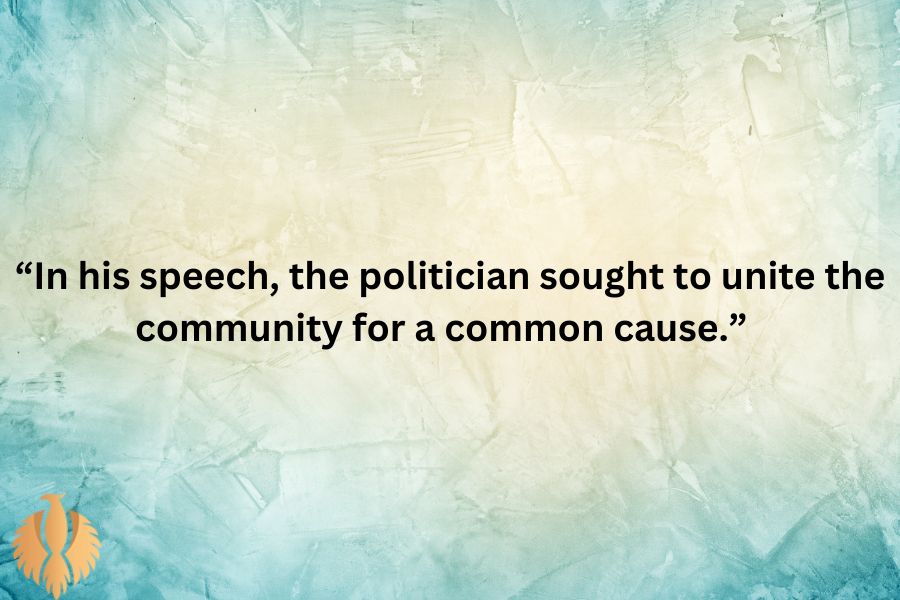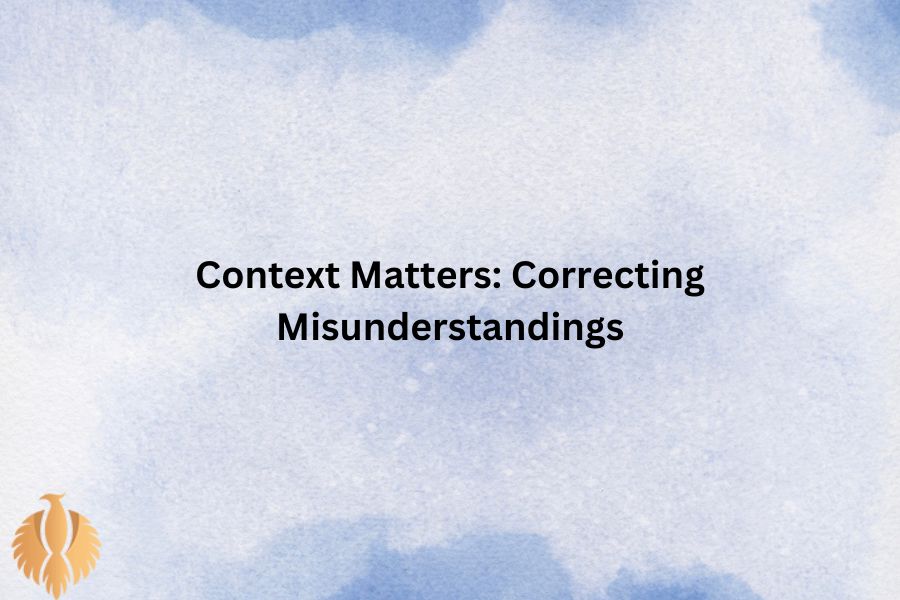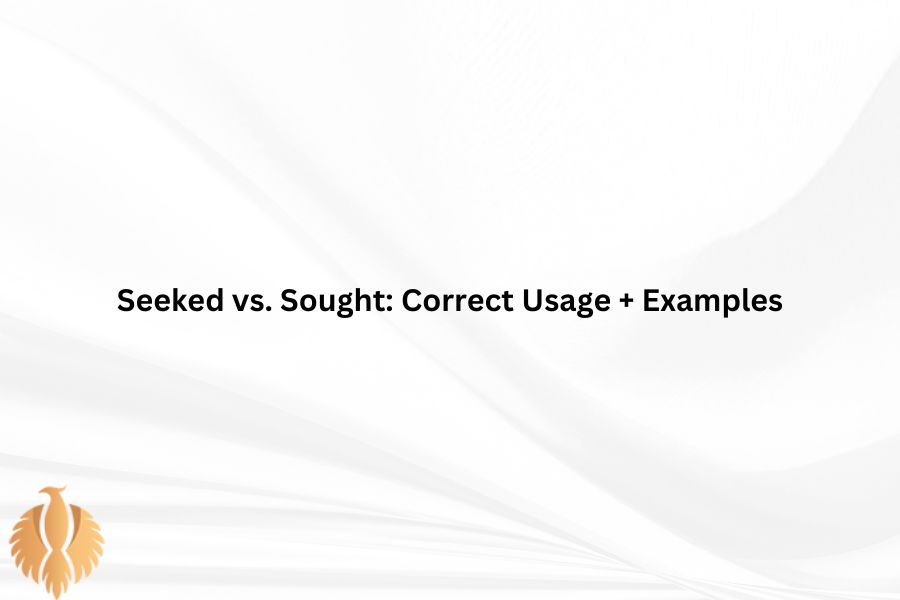When grappling with the nuances of English grammar, one might find themselves wondering whether to use “seeked” or “sought.”
The answer is clear: “sought” is the correct form, while “seeked” is a common misconception. Understanding the proper usage of “sought” is essential for clear communication and effective writing.
This article will explore the correct forms, clarify misconceptions, and provide a plethora of examples for both terms to enhance your understanding of their usage in various contexts.
You might also enjoy: Which of the Following: Definition + Complete Usage + Grammar
Understanding the Verb “To Seek”
To fully grasp the distinctions between “seeked” and “sought,” we must first examine the verb “to seek.” The verb “seek” means to search for, look for, or attempt to find something. The present tense is “seek,” while the past tense, which is frequently used in various contexts, is “sought.”
Why ‘Sought’ is the Correct Form
The confusion surrounding “seeked” arises from the general rule of adding “-ed” to form the past tense of regular verbs.
However, “seek” is an irregular verb, meaning it does not follow this pattern. The past participle as well as the simple past form of “seek” is “sought.”
This is the correct term to use when referring to past actions of seeking.
Example Sentences with ‘Sought’

- “He sought guidance from his mentor before making a decision.”
This illustrates the proactive approach taken by individuals when faced with significant choices. Seeking assistance from someone more experienced reflects a desire to make informed decisions and avoid pitfalls.
- “The authorities have sought to understand the reasons behind the incident.”
Here, “sought” conveys a systematic investigation, showcasing the diligence authorities exhibit in their duty to maintain order and justice. It reflects a methodical effort to uncover truths that may not be immediately evident.
- “Many students sought scholarships to help fund their education.”
This example highlights the financial struggles students often face. The act of seeking scholarships demonstrates initiative and determination, suggesting that education is of great value to the individuals involved.
- “She sought revenge for the wrongs done to her family.” ⌨️
This reflects emotional depth, showcasing how human emotions can drive actions. The pursuit of revenge signifies significant internal conflict and moral dilemmas often depicted in literature and stories.
- “The lost travelers sought shelter as the storm approached.”
In a survival context, “sought” signifies a critical urgency. This sentence captures the instinctual need for safety in dire situations, highlighting human vulnerability in nature.
- “In her quest for truth, she sought the opinions of various experts.”
This demonstrates the rigor with which individuals often pursue knowledge. Seeking expert opinions reflects a willingness to consider multiple viewpoints, enhancing decision-making through informed consent.
- “The treasure hunters sought the legendary jewels rumored to be hidden in the cave.”
Utilizing “sought” in this sense evokes adventure and excitement. It portrays the thrill of exploration and the lengths to which people will go to uncover hidden treasures, both literal and metaphorical.
- “Throughout history, people have sought freedom and justice.”
This sentiment captures the zeitgeist of many movements throughout time. The use of “sought” here indicates collective human aspiration for rights and equity, driving societal change.
- “The researcher sought to uncover new insights through her experiments.”
In this example, “sought” emphasizes the scientific method’s essence, illustrating how researchers actively pursue knowledge and innovation, thereby contributing to societal progress.
You might also enjoy: To Bad Or Too Bad – Correct Grammar + Examples [2024
- “In his speech, the politician sought to unite the community for a common cause.”

This highlights the role of leaders in fostering collaboration. The phrase indicates the importance of communication and persuasion in mobilizing action toward societal goals.
- “They sought a solution to the environmental issues facing their town.”
This example emphasizes proactive community engagement. The use of “sought” shows a responsible approach to addressing critical issues that affect everyone, showcasing collective ownership and responsibility.
- “He sought to improve his skills through rigorous practice.”
This sentence reflects the discipline and determination underlying personal growth. It emphasizes that effort and dedication are integral to honing one’s abilities, echoing the adage that practice makes perfect.
- “After years of searching, they finally sought the lost city long rumored to exist.”
Here, “sought” suggests a long-term, almost mythical pursuit, embodying the human desire for exploration and discovery. It indicates that some quests extend beyond the physical, tapping into legends and dreams.
- “The charity sought donations to support their humanitarian efforts.”
In this instance, “sought” reflects altruism and communal responsibility, emphasizing how organizations actively search for resources to help others, thereby showcasing compassion.
- “The detective sought clues to solve the perplexing case.”
In this context, “sought” highlights the investigative process and the meticulous nature of solving crimes. It suggests holding onto hope and determination even when faced with ambiguity.
- “The environmentalists sought to raise awareness about climate change.”
This demonstrates advocacy efforts by individuals who feel a responsibility to educate others about critical issues affecting the planet.
- “She sought a moment of peace amid the chaos that surrounded her.”
This showcases personal reflection, as one may often look for tranquility within tumultuous circumstances.
- “During the renovation, the homeowners sought advice from several contractors.”
This reflects the importance of collaboration and obtaining professional input to ensure the quality of a project.
- “The student sought clarification on the complex theorem before the exam.”
This emphasizes the proactive nature of learning, depicting a student who values understanding over simply memorizing information.
You might also enjoy: Boys’ or Boy’s– Which One is Correct? + Example
- “The artist sought inspiration from nature for her latest masterpiece.”

This example illustrates the connection between artistry and the natural world, underscoring how surroundings can stimulate creativity.
- “In his interview, he sought to convey his vision for the future of the company.”
Here, “sought” emphasizes the importance of clear communication, especially in professional settings where articulating goals is crucial.
- “The historian sought to piece together the fragmented narratives of the past.”
This showcases the critical analysis involved in historical research, highlighting how understanding history requires effort to connect various perspectives.
- “She sought comfort in books after the loss of a loved one.”
This indicates the therapeutic role literature plays for many, providing solace and refuge during challenging times.
- “The students sought to create a more inclusive environment at their school.”
This illustrates the desire for progressive change within educational institutions, emphasizing the importance of advocacy among youth.
- “The parents sought recommendations for after-school activities for their children.”
This reflects the responsibility parents feel in enriching their children’s lives and ensuring they have productive outlets.
- “The startup sought investment to launch their innovative technology.”
This example emphasizes the competitive nature of entrepreneurship, underscoring the critical role of securing funding in business development.
- “The volunteers sought to make a difference in their local community.”
Here, “sought” shows a commitment to service and highlights the impact that individuals can create when they come together for a cause.
- “He sought to balance his work and personal life more effectively.”
This conveys the struggle many face in achieving harmony between various responsibilities, underscoring the common desire for well-being.
- “The group sought to develop strategies for better mental health awareness.”
This example illustrates the importance of advocacy and education regarding mental health, emphasizing a proactive approach to destigmatization.
- “As the storm approached, the campers sought higher ground for safety.”
This instance captures the instinctual response to danger, portraying how humans often react logically to protect themselves and others.
You Might Also Enjoy: Top 60 Most Common Simple Sentences In English
Context Matters: Correcting Misunderstandings

Using “seeked” instead of “sought” can lead to confusion and undermine the credibility of your writing. For example, saying, “He seeked the truth” is incorrect; the proper phrasing is “He sought the truth.”
Recognizing “sought” as the correct form enhances clarity and demonstrates a strong command of English grammar.
The Importance of Writing Correctly
In writing, using the correct form is crucial for maintaining credibility and authority. Incorrect usage, such as “seeked,” can distract readers and detract from the message you intend to convey.
Correctly using “sought” instead of “seeked” ensures that your writing is perceived as polished and professional.
It also helps avoid misinterpretations and ambiguity, making it easier for readers to grasp your intended meaning.
You Might Also Enjoy: Top 60 Most Common Simple Sentences In English
Cultural Significance of Seeking

The act of seeking holds profound significance in various aspects of human experience. Culturally, “seeking” can symbolize pursuit of knowledge, truth, or understanding.
It encapsulates the essence of exploration, whether it be in academic research, personal journeys, or spiritual quests.
The phrase “the search for truth” is a common trope in literature and philosophy, emphasizing the importance of actively pursuing what one values or believes to be essential.
Conversely, the erroneous use of “seeked” detracts from the gravity and intention behind the act of seeking.
Accurate language use reflects respect for the pursuit itself, as well as the traditions and narratives that have shaped our understanding of seeking as a universal human experience.
FAQs
1.What is the correct past tense of “seek”?
The correct past tense of “seek” is “sought.”
2.Can “seeked” be used interchangeably with “sought”?
No, “seeked” is an incorrect form; only “sought” should be used as the past tense of “seek.”
3.What does “sought” imply in a broader context?
“Sought” often conveys a deeper pursuit of goals, aspirations, truths, or personal growth beyond mere physical searching.
4.Are there other irregular verbs similar to “seek”?
Yes, many verbs are irregular, such as “go” (went), “know” (knew), and “catch” (caught).
5.What is an example of “sought” used in a figurative sense?
“In her quest for happiness, she sought not just wealth but meaningful connections.”
6.Why is it important to use “sought” instead of “seeked” in formal writing?
Using the correct form “sought” demonstrates attention to detail and a clear understanding of English grammar, which is essential for maintaining professionalism in formal writing.
7.Can “sought” be used in both personal and professional contexts?
Yes, “sought” can be used in a variety of contexts, including personal goals (like seeking happiness) and professional scenarios (like seeking funding), making it a versatile verb.
8.Are there any idiomatic expressions that include the word “sought”?
Yes, phrases like “sought after” or “sought wisdom” show how “sought” can be part of idiomatic expressions, emphasizing the desirability of certain qualities or knowledge.
9.How can I improve my usage of “sought” in writing?
To improve your usage of “sought,” practice incorporating it in various contexts, such as in discussions about aspirations, research, or personal experiences, and seek feedback on your writing style.
10.What common mistakes do people make when using “sought”?
A common mistake is confusing “sought” with its incorrect form “seeked,” especially among those who are not familiar with irregular verbs, leading to grammatical errors in both speech and writing.
11.Can “sought” be used in the present perfect tense?
Yes, “sought” can be used in the present perfect tense as in “I have sought help for my project.” This construction indicates that the action of seeking occurred in the past but has relevance to the present.
12.Is there a difference between “sought” and “sought out”?
Yes, “sought out” adds an extra layer of specificity and effort, implying not just the act of seeking but actively searching for something or someone that is more difficult to find.
For example, “She sought out experts to gain deeper insights” suggests a more intentional and thorough pursuit than simply “She sought experts.”
Conclusion️
In conclusion, understanding the difference between “sought” and the incorrect “seeked” is critical for effective communication in English.
“Sought” reflects the correct grammatical structure necessary for expressing past actions of searching or desiring.
Embracing and using the proper terminology not only showcases mastery of language but also honors the significance of the pursuit, whether it’s seeking knowledge, truth, or fulfillment in life.
Effective communication is more than just conveying meaning; it’s about connecting with others through clarity and understanding.
By using language accurately, we enrich our discussions and foster a deeper appreciation for the nuances of the English language.
Remember, as you navigate your pursuits, it’s essential not only to seek but to articulate your journey thoughtfully and correctly.

Hi, welcome to my blog! My name is Omid and I am thrilled to have you here! I am an English language teacher with 12 years of experience and hold multiple international certifications (TESOL, IELTS, TOEFL, PTE, CELTA). Additionally, I hold a PhD in Applied Linguistics with a specialization in Teaching English as a Second Language (TESL), which fuels my passion for teaching English and assisting others in mastering the language. To me, nothing is more rewarding than helping individuals enhance their English language abilities through various methods. So, let’s embark on this journey of learning English together.




